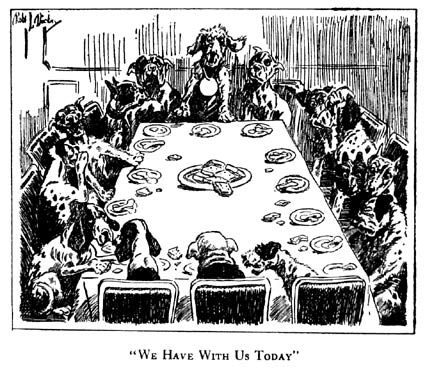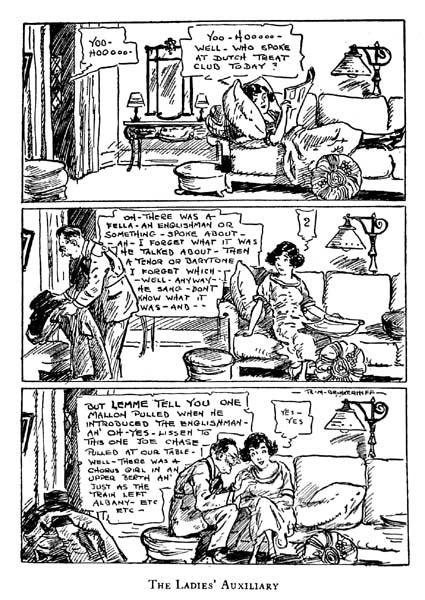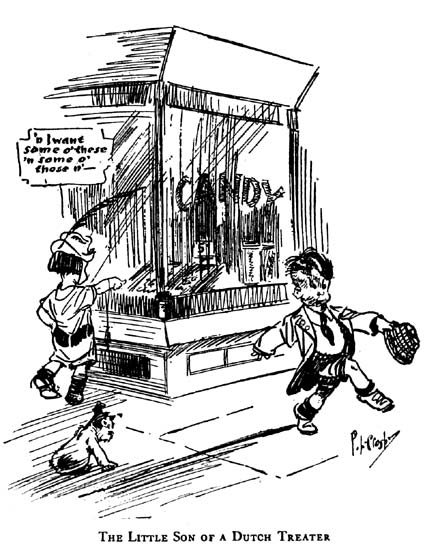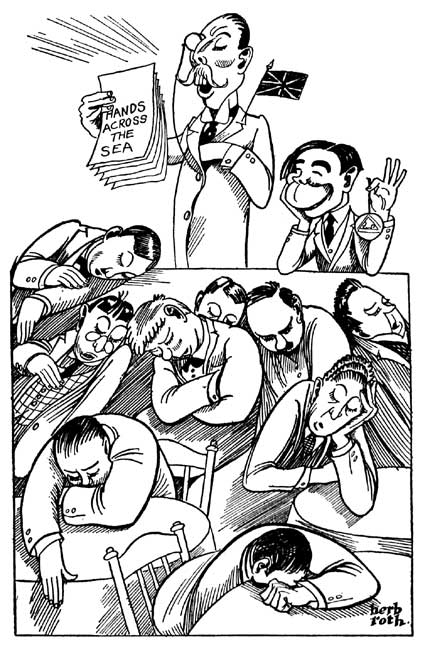from Dutch Treat Club Year Book
What Is the Dutch Treat Club?
by Ellis Parker Butler
Five thousand nine hundred and twenty-seven years ago (Usher's chronology) God created the world and, some time later, Bob Yard and Tom Masson came to town together on a morning train from Glen Ridge, New Jersey. Up to that time the world had not amounted to much, one way or the other. Many had noticed this, but no one had done anything about it.
So Tom Masson took a seat beside Bob Yard on the morning train from Glen Ridge, New Jersey, the steam locomotive having been invented by George Stephenson, July 25, 1814. "Good morning, Tom," said Bob Yard, who was then in the publishing business, printing having been invented by Johannes (or Henne) Gutenberg (originally Gensfleish), Dec. 12, 1439.
"Good morning, Bob," said Tom Masson cheerily, "it is a nice morning this morning," the remark having been invented by Noah, at or near Mount Ararat, January 1, 2348 B.C.
"Is that a joke?" inquired Bob Yard suspiciously, for Tom Masson was at that time an editor of Life, a weekly magazine published for the purpose of permitting Tom Masson to be an editor of Life.
"If it were," said Tom Masson, "I would -- hah -- grin. And I am not grinning. I am sad. I am sad to think that -- hah -- so many fine fellows in literature, art and -- hah -- editorial fields come to New York every day and never meet from one end of the year to the other."

"It is indeed, dear Tom," said Bob Yard, "a dodgasted shame!"
"Then why would it not, dear Bob," asked Tom Masson, "be an admirable idea to choose an eating place where -- hah -- the finer spirits or, as I may say, the real guys could drop in to lunch one stated day each week?"
"Why would it not, indeed, dear Tom," said Bob Yard.
Despite the persistence of the legend that Christopher Columbus (b. 1446 -- d. 1506) said, on leaving Palos, Spain, August 3, 1492: "Bon jour, Marie; I shall not return until I have discovered a suitable continent on which a Dutch Treat Club may be established," the above is the only authentic story of the primal conception of the idea of a Dutch Treat Club.
The subsequent history of the Dutch Treat Club is one of which the members might well be proud if they cared a darn, but they don't. The only matters connected with the Dutch Treat Club for which the members care less than they care for its history are its Constitution and By-Laws, if there are any. No one knows. No one cares.
From that first little gathering of a handful of dauntless hearts at the old St. Denis Hotel the progress of the Dutch Treat Club has been steadily up and down hill. Under the stern but just kingship of Thomas Masson a warm Life flowed in its veins, and during the caliphate of Jimmy Monty Flagg an imperial edifice was erected that continued imperishably until it melted. And today, under the relentless tyranny of the triumvirate -- George B. Mallon, G. B. Mallon and George Barry Mallon -- the Dutch Treat Club has reached a height never before reached except previously, and probably never to be reached again except at some time in the future, if not sooner.
At the present time, if I may use the phrase, the Dutch Treat Club has a full membership of 300, an ample and impatient waiting list, and a Barkis constituency of 3000 to 4000, all "willing" but hopeless. The Club list is the best "Who's Who" in writing, illustrating, painting and so forth producible by any organization in America. Our President himself, one of our Charter Members, declares that were he not already a member of the Club he would not feel qualified to be presented for membership. While maintaining its delightful informality and its quality of being a chop house where good friends may drop in to lunch when they choose, the Club is becoming, more and more, an organization to which election means that a man has really done something. With trivial dues, inexpensive food and no other expenses the Club is able to avoid the need of "cramming" its membership list with dead wood. A bankrupt Bobbie Burns could belong but a climbing Croesus would not even be nominated for membership. And no women.

Four or five years ago our present presentable President suggested trying out the plan of having some distinguished speaker at each luncheon. This had been tried now and then. Possibly the few brief words spoken by the embarrassed and bashful William J. Locke many years ago was the first occasion. It was not then a Club custom and was then, as now, an honor conferred upon distinguished fellow workers. The President's plan has been most successful. The membership of the Club is such that men of the highest standing in the world's affairs are willing to talk to us, safe in our rule that the talks given us are never reported in the press unless especial permission is given by the speaker. To us our guests can speak openly. Because of this, and because of the inherent influence (what in thunder is an "inherent influence" anyway?) of such a group of men as forms our audience, we have been able to listen to great statesmen of all lands who have not spoken elsewhere. Because of the well-known friendliness of good fellows here, as all the world around, we have been permitted to hear men who have done fine things but who are not -- in their own opinions -- equipped for public speaking. In like manner we have heard the greatest musicians of America and of foreign lands.
Once each year the Dutch Treat Club gives its "Show," usually a comic opera, with addenda of one sort or another, the entire affair written, composed, acted, directed and managed by Club members. The "Show" is given on the evening of the Annual Dinner, and follows it, and not yet has the capacity of any room engaged been equal to the demands for tickets.
To me the best indication of the emmeleia or, to speak plainly, the basic congruence of the idea of the Dutch Treat Club with the indestructible motif-bases of creation, is seen and heard in the double-action jaw-work of the members each Tuesday at 12:30. Here we find no piffling food-tasting. Here we hear no halting-whispered chit-chat of imitation highbrows. Our members leap into soup and conversation with both feet, both fists and both jaws. A week of pent-up you-to-me talk breaks its leash like a hundred hunt-hounds dashing after the quarry. It is a Bacchic revel of talk and tom-cod, conversation and consomme, sound and salad. Those present are on hand because they want to be and not because it is an occasion. Nothing is less important than being on hand at a Dutch Treat Club luncheon; nothing is pleasanter.

The member just back from a Russian prison cell drops in to lunch and is greeted with "Hello, Bill; been away?" Going to the ends of the earth, writing the year's best seller, creating the public opinion of the continent -- these are the regular day's work of the members and the subject of a moment's careless shop-talk. If a member has an eminence complex he checks it at the coat-room before he enters.
To write in this serious vein of the Dutch Treat Club is an offence and for so writing I should be expelled, but I can't be expelled because I am a Charter Member, or -- as I believe we call it -- a Founder. As I cannot be expelled I apologize.
